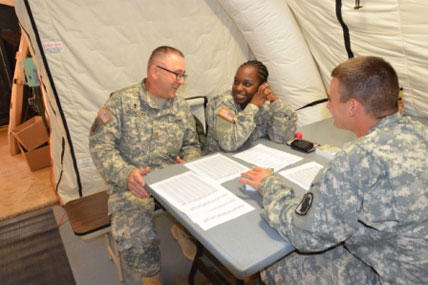PAYNESVILLE, Liberia – Singing, clapping, praying and the reading of words in a Bible are all commonplace in a church service. That scene hasn’t changed, even in Liberia.
Army Chaplain (Maj.) Alfred Grondski, assigned to Headquarters and Headquarters Company, 36th Engineer Brigade, Fort Hood, Texas, provides religious support to all service members at the National Police Training Academy, in support of Operation United Assistance here.
“I minister closely with people I work with,” said Grondski, a Trenton, New Jersey, native. “That usually doesn't happen back in the states like it is here, because in garrison a lot of the soldiers go to their home church. There isn't a home church here. This gives us an opportunity to come together as a family and worship.”
Spiritual Support
Grondski said his mission in Liberia is to provide spiritual support to the soldiers while they conduct their missions to build Ebola treatment units. He's been to several sites, seeing the soldiers’ hard work for a good cause.
“My son told me that he was proud of me because I'm out here helping people that need help,” Grondski said. “I remind the soldiers about the mission and the difference we make in Liberia.”
There were a high number of cases of Ebola here and now the number has dropped significantly, Grondski said.
“No matter how big or how small our job here is, we all have important roles,” the chaplain said.
In a deployed environment, it's not like soldiers can go home and unwind, he said. Being resilient, he added, is one of the key factors in mission readiness and sustainment.
“We give people a sacred place to have some time off from work in a deployed environment,” Grondski said. “That way, they can decompress and get more time with God.”
Assisting Soldiers, Commanders
Grondski said he asks soldiers how they are doing, observing the environment and supporting the commander.
“Some soldiers are more comfortable talking to me rather than going directly to their leadership,” Grondski said. “I'm kind of like the eyes and ears of the commander. I just hint to the commander that, ‘Hey, maybe you might want to check out the company and see how they're doing.’ Pretty-much gauge morale.”
Grondski said he works with the other chaplains and provides support such as services during the holidays. The Christmas candle-lighting, he said, was his favorite.
Army Chief Warrant Officer 3 Ezekiel Sheridan, chief officer of human resources for HHC, 36th Engineer Brigade, said he enjoys supporting the chaplain.
“Being around him is very enlightening,” said Sheridan, who hails from Angie, Louisiana. “You can tell that he's very authentic. He has real love for what he does and real love for soldiers.”
Grondski said he's learned a lot about Liberians during his deployment here.
“I see smiles on their faces -- lots of places of worship -- their spiritual morale is very high,” the chaplain said.



























